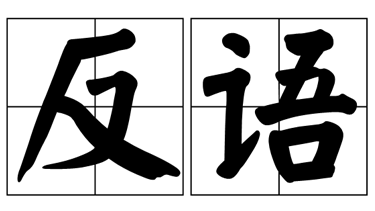反语是指正话反说或反话正说,又称“反讽”、“反说”、“反辞”等,即通常所说的“说反话”,运用跟本意相反的词语来表达此意,却含有否定、讽刺以及嘲弄的意思,是一种带有强烈感情色彩的修辞方法。不论是正话反说,还是反话正说,比起直白的表达来都更为有力,语气更为强烈,情感更为充沛,给人的印象也更加鲜明。辞表和辞里的极端偏离,使言外之意、弦外之音更为深刻。
例句 Example sentence:
nǐ zhēn cōng ming ! zhè me róng yì de tí mù yě huì zuò cuò ?
你真聪明!这么容易的题目也会做错?
You are so smart! How did you make a mistake for such an easy question?
基本种类
根据说话者的对象不同、说话者的感情不同,反语可以分为两大类:讽刺反语和风趣反语。
1.讽刺反语
讽刺反语是为了揭露、批判、讽刺、嘲弄,表达贬义的反语,是通常所见的用法。
2.风趣反语
风趣反语是为了风趣、幽默、诙谐而说的反语,字面表达的是贬义,实际上是表达褒义,或因情深难言,或因避嫌忌说,并不包含讽刺嘲弄之意。
Irony refers to the right words or the opposite words, also known as “irony”, “anti-talk”, “anti-words”, etc., which is commonly referred to as “irony”, using words that are contrary to the original meaning to express this meaning, but Containing the meaning of negation, irony and mockery, it is a rhetorical method with a strong emotional color. Regardless of whether it is straight or wrong, it is more powerful than straightforward expression, the tone is stronger, the emotion is more abundant, and the impression is more vivid. The extreme deviation of the vocabulary and the rhetoric makes the illocutionary and illocutionary more profound.
Basic types
According to the different objects of the speaker and the different feelings of the speaker, irony can be divided into two categories: irony irony and funny irony.
1. Satirical Irony
Satirical irony is to expose, criticize, ridicule, mock, express derogatory irony, and is a commonly seen usage.
2. Funny irony
Funny irony is an irony spoken for the sake of being funny, humorous, and humorous. It literally expresses a derogatory meaning, but actually expresses commendation, either because of deep affection, or because of suspicion, and does not contain irony.


